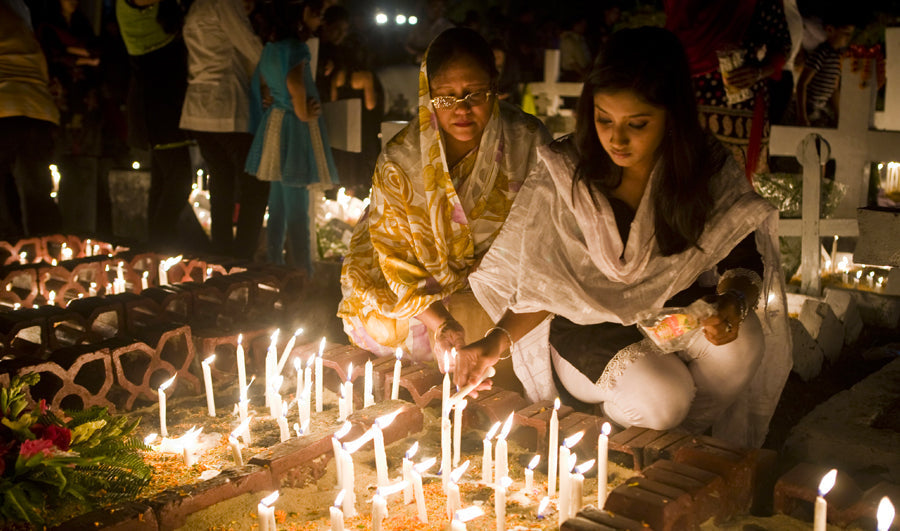Excellent explanation… thanks

Is Halloween Catholic? The True Story Behind All Hallows' Eve
|
|
|
|
When you think of Halloween today, you probably picture costumes, candy, and pumpkins - but did you know that Halloween actually began as a very Catholic holiday? Over time, much of its meaning has been stripped away or replaced with pagan and commercial influences. But at its core, Halloween was never meant to glorify darkness—it was meant to prepare hearts for the light of Heaven.
As Catholics and especially in Catholic families with children, knowing the real history of Halloween help to reclaim the special time of year and celebrate it faithfully. At Catholic Home and Church, we love helping families rediscover the traditions that make our Catholic homes shine bright as lights to the world - whether through faith-filled celebrations or thoughtful Catholic gifts.
The word Halloween is really just a reconstructed version of Hallows’ Eve.
So Halloween literally means the Eve of All Saints Day - a vigil before one of the Church’s greatest feast days.
Catholics are generally aware that many saints have feast days in the liturgical calendar. However, there are only 365 days in the year, so All Saints Day provides a chance to celebrate and commemorate every soul in heaven.
From the earliest days of Christianity, Catholics honored the martyrs and saints with prayer vigils on this "saints' evening." Candles lit up the night, reminding the faithful that the lives of the saints bring light into a darkened world. All Saints’ Day (November 1) and All Souls’ Day (November 2) became the anchor of this holy season, turning late October into a time of reflection on heaven, holiness, and the hope of eternal life.
Some claim that Halloween is nothing more than a baptized version of the Celtic festival Samhain (pronounced saw·win). While Samhain did exist, the truth is more nuanced.
All Saints Day was fixed on November 1 by Pope Gregory III in the 8th century, when he dedicated a chapel in St. Peter’s Basilica to honor all the saints. This Catholic feast predates the modern Halloween customs we know today.
In fact, most Halloween traditions - costumes, trick-or-treating, jack-o’-lanterns - developed in the last 500 years, long after the Christian feast was established. The real foundation of Halloween has always been Catholic, not pagan.
"In contrast to popular culture's observance of Halloween, even the customary appeal to the 'frightful' has a devotional meaning in the Catholic tradition. Props such as skulls and scythes have historically recalled our mortality, reminding us to be holy because we are destined for judgement. Visible symbols of death thus represent a reminder of the last things - death, judgement, Heaven, and hell."
Halloween, like anything else, should be discerned through the lens of our Catholic Faith. There are elements of the secular holiday that would be sinful on any day of the year. If drunkenness, immodest outfits, and demonic costumes are avoided, for example, fun can still be had.
So, how can Catholic families bring the faith back into Halloween? Here are some ideas to help make your Catholic home a place where this season points to God:
Start with Prayer - Light candles at dinner or say the Litany of the Saints as a family. Remind your children that this night is really the vigil of All Saints' Day.
Honor the Faithful Departed - Visit a cemetery and pray for the souls in purgatory. This is a powerful act of mercy and ties beautifully into All Souls' Day. It is also good to teach children the beauty of a peaceful cemetery, against the common cultural stereotypes of the 'haunted graveyard.'
Dress as Saints, Angels, or Biblical Heroes - Encourage your children to pick costumes that inspire holiness rather than glorify darkness.
Host a Catholic Home "All Saints Party" - Celebrate with games, treats, and saint-themed activities. Hand out saint holy cards or small Catholic gifts along with candy.
Talk About Heaven - Share stories of the saints, and remind children that our true goal is eternal life with God.
By making these small changes, Halloween becomes a joyful family tradition rooted in faith. You don't have to uproot everything, you can still trick-or-treat, you can still have good fellowship with the neighbors, just remember to place the focus first on the light of Christ.
Looking for a way to teach your children the truth about Halloween? We're excited to carry a brand new book at Catholic Home and Church that does just that:
All Hallows' Eve - A kids' Halloween book that puts prayer before pumpkins.
In this story, a group of friends encounter Hulga May, a mysterious woman who tells a tale about the power of prayer and penance for the Holy Souls in Purgatory. Through her haunting story, children discover that Halloween is not about fear, but about faith.
✨ Why Catholic families love this book:
Give your children a story that shapes their Catholic imagination and brings faith into your family's celebration. Catholic Halloween starts here.
Catholic families should avoid the secular excesses of Halloween: immodest costumes, glorification of evil, drunkenness, or anything that mocks the faith. But there is nothing wrong with dressing up, enjoying candy, or spending time with neighbors - so long as we keep Christ at the center.
TLDR: Halloween isn't about celebrating darkness. It's about remembering that the light of Christ conquers the grave. When Catholic homes embrace this season and holiday as it was meant to be, we not only enjoy a fun tradition - we reclaim a piece of our Catholic faith and deep truths that can be passed on for generations.
Comments
Excellent explanation… thanks
Thank you for this post. My husband and I have been struggling with allowing our kids to celebrate Halloween as it’s been seen as a demonic holiday. This helps up be able to allow the fun of the holiday while keeping it centered around our faith.
Great truth. Thank you




